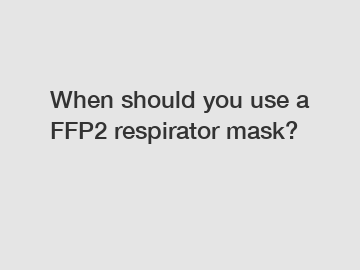Dec. 15, 2023
Security & Protection
When Should You Use a FFP2 Respirator Mask?
Respirator masks have become an essential part of our day-to-day lives due to the ongoing COVID-19 pandemic. With various types of masks available, it can be confusing to determine which one is most suitable for different situations. One popular choice is the FFP2 respirator mask. This article aims to shed light on when it is appropriate to use this particular mask and its significance in protecting against airborne particles.
Understanding FFP2 respirator masks.

FFP2 stands for "Filtering Face Piece 2," and these masks are designed to filter out airborne particles, including small droplets and particles that may contain viruses or bacteria. These masks are often recommended for use in healthcare settings or by individuals who are in close contact with a large number of people. FFP2 masks have a high level of filtration efficiency, typically around 94%, making them one of the most effective mask options.
When should you use a FFP2 respirator mask?
1. Healthcare settings - FFP2 respirator masks are extensively used in healthcare settings, such as hospitals, clinics, and nursing homes. Healthcare workers are in direct contact with patients and are at a higher risk of exposure to airborne particles. These masks help protect healthcare professionals by filtering out harmful particles and preventing them from inhaling potentially infectious droplets.
2. High-risk environments - FFP2 respirator masks are recommended in high-risk environments with a higher likelihood of exposure to airborne particles. These include construction sites, factories with dust or chemical fumes, and laboratories working with hazardous substances. Using FFP2 masks in such settings can help reduce the risk of respiratory problems caused by inhalation of harmful particles.
3. Public transportation - When using public transportation, especially in crowded areas, FFP2 respirator masks can provide an extra layer of protection. Buses, trains, and airplanes can be breeding grounds for airborne particles due to the close proximity of passengers. Wearing a FFP2 mask can help minimize the risk of inhaling infected droplets from nearby individuals.
4. Traveling to high-risk areas - If you are planning to visit an area with a high number of COVID-19 cases or other respiratory illnesses, wearing a FFP2 mask is strongly recommended. These masks offer a higher level of protection compared to cloth masks or surgical masks, making them suitable for environments where the risk of airborne transmission is significant.
5. Individuals with underlying health conditions - People with underlying health conditions, such as asthma or compromised immune systems, are more vulnerable to respiratory infections. Using a FFP2 respirator mask can provide them with added protection when they are in situations where exposure to airborne particles is likely.
Closing thoughts.
In conclusion, FFP2 respirator masks are a valuable tool in combating the transmission of respiratory infections. They offer a high level of filtration efficiency and are particularly useful in healthcare settings, high-risk environments, crowded public spaces, and areas with a high prevalence of respiratory illnesses. Individuals with underlying health conditions can also benefit from using these masks as an extra precautionary measure. If you find yourself in any of these situations, consider using a FFP2 respirator mask to protect yourself and those around you.
If you have any further questions or need assistance regarding respirator masks, feel free to contact us. Stay safe!
If you are looking for more details, kindly visit ffp3 duckbill shape protective mask, kn100 mask suppliers, kn100 class duckbill shaped masks manufacturer.
If you are interested in sending in a Guest Blogger Submission,welcome to write for us!
All Comments ( 0 )